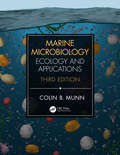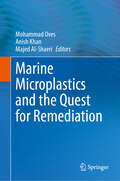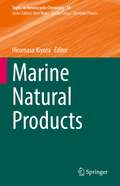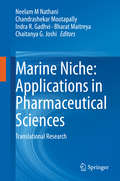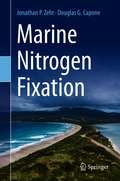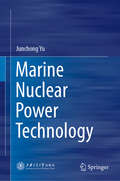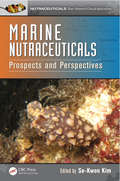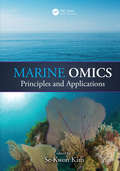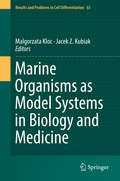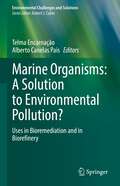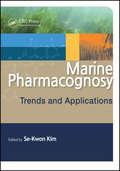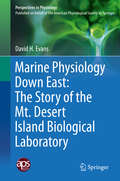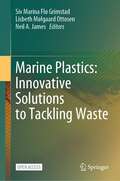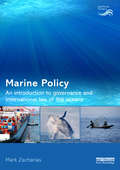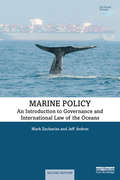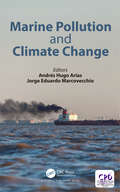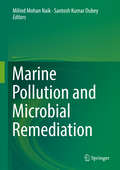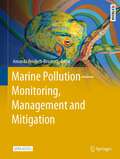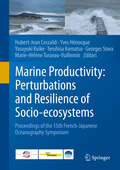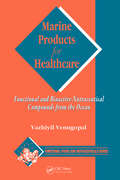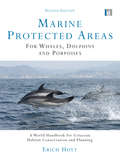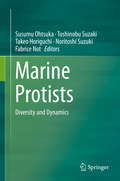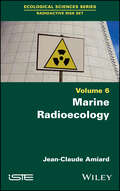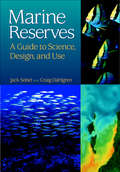- Table View
- List View
Marine Microbiology: Ecology & Applications
by Colin B. MunnThe third edition of this bestselling text has been rigorously updated to reflect major new discoveries and concepts since 2011, especially progress due to extensive application of high-throughput sequencing, single cell genomics and analysis of large datasets. Significant advances in understanding the diversity and evolution of bacteria, archaea, fungi, protists, and viruses are discussed and their importance in marine processes is explored in detail. Now in full colour throughout, all chapters have been significantly expanded, with many new diagrams, illustrations and boxes to aid students’ interest and understanding. Novel pedagogy is designed to encourage students to explore current high-profile research topics. Examples include the impacts of rising CO2 levels on microbial community structure and ocean processes, interactions of microbes with plastic pollution, symbiotic interactions, and emerging diseases of marine life. This is the only textbook addressing such a broad range of topics in the specific area of marine microbiology, now a core topic within broader Marine Science degrees. A Companion Website provides additional online resources for instructors and students, including a summary of key concepts and terminology for each chapter, links to further resources, and flashcards to aid self-assessment.
Marine Microplastics and the Quest for Remediation
by Mohammad Oves Anish Khan Majed Al-ShaeriThis informative book discusses the issue of microplastic pollution in marine environments. It explains the intricate ways in which these minuscule particles have crept into the world's oceans, impacting marine life, ecosystems, and, ultimately, human health. The book provides a detailed depiction of pristine marine environments, which are increasingly being compromised by microplastic pollution. The effects of these microplastics are the main focus of the book. It provides alarming evidence that marine life – from the tiniest plankton to the largest whales – mistakenly identifies microplastics as food. Plastics are introduced into the food chain, accumulating in the trophic levels of humans, in addition to causing internal obstructions and health problems for the animals. The book also shows how microplastics can carry infections and toxins, amplifying their negative consequences. It discusses cutting-edge technical solutions for ocean cleanup, as well as international agreements and laws aimed at trash management and plastic production. The book emphasizes the value of scientific investigation in determining the full scope of the issue and in creating biodegradable substitutes for conventional plastics. This book will be of significant interest to environmental enthusiasts and activists; academics, scientists, and researchers studying marine biology, oceanography, and environmental science; policymakers and government agencies; as well as industry professionals working in plastics manufacturing, waste management, and environmental consulting.
Marine Natural Products (Topics in Heterocyclic Chemistry #58)
by Hiromasa KiyotaThis book is a compilation of the latest achievements of leading researchers in marine natural products with extremely diverse structures and biological activities. It presents discussions of isolation, structure elucidation, biosynthesis, total synthesis, and biochemical properties of the compounds with characteristic structures such as macrolides, cyclic depsipeptides, alkaloids, and water-soluble heterocyclic low-molecular-weight compounds, from sponges, bacteria, cyanobacteria, flagellates, and other such organisms. The book especially focuses on heterocyclic natural products as a title in the book series, Topics in Heterocyclic Chemistry.
Marine Niche: Translational Research
by Chaitanya G. Joshi Neelam M Nathani Chandrashekar Mootapally Indra R. Gadhvi Bharat MaitreyaThis book offers a comprehensive study of biological molecules acquired from marine organisms, which have been exploited for drug discovery with the aim to treat human diseases. Biomolecules have potential impacts on a diverse range of fields, including medical and pharmaceutical science, industrial science, biotechnology, basic research, molecular science, environmental science and climate change, etc. To understand and effectively apply medicinally important biomolecules, multidisciplinary approaches are called for. The ocean remains a rich biological resource, and the vast untapped potential of novel molecules from marine bio-resources has caught the interest of more and more researchers. These novel biological compounds have never been found in terrestrial or other ecosystems, but only in this rich niche. Advances in sampling techniques and technologies, along with increased funding for research and nature conservation, have now encouraged scientists to look deeper in the waters. Aquaculture supports both tremendous seafood production and the bulk production of marine-derived drugs. Furthermore, molecular methods are now being extensively employed to explore the untapped marine microbial diversity. With the help of molecular and biotech tools, the ability of marine organisms to produce new biosynthetic drugs can be greatly enhanced. This book provides an extensive compilation of the latest information on marine resources and their undisputedly vital role in the treatment of diverse ailments.
Marine Nitrogen Fixation
by Jonathan P. Zehr Douglas G. CaponeThis book aims to serve as a centralized reference document for students and researchers interested in aspects of marine nitrogen fixation. Although nitrogen is a critical element in both terrestrial and aquatic productivity, and nitrogen fixation is a key process that balances losses due to denitrification in both environments, most resources on the subject focuses on the biochemistry and microbiology of such processes and the organisms involved in the terrestrial environment on symbiosis in terrestrial systems, or on largely ecological aspects in the marine environment. This book is intended to provide an overview of N2 fixation research for marine researchers, while providing a reference on marine research for researchers in other fields, including terrestrial N2 fixation.This book bridges this knowledge gap for both specialists and non-experts, and provides an in-depth overview of the important aspects of nitrogen fixation as it relates to the marine environment. This resource will be useful for researchers in the specialized field, but also useful for scientists in other disciplines who are interested in the topic. It would provide a possible text for upper division classes or graduate seminars.
Marine Nuclear Power Technology
by Junchong YuThis book introduces readers to basic approaches in and principles of marine nuclear power design, including overall reactor design, in-core design, coolant systems and devices, I&C system design, safety system design, and dynamic analysis assessment. It comprehensively reviews both the fundamentals of and latest trends in nuclear-powered devices, covering their entire lifespan, from design and testing to operation and decommissioning. Further, it explores in detail various real-world conditions in the marine context – such as insufficient space for equipment deployment and frequently changing operating conditions as well as swinging and tilting. Offering extensive information on the design and operation of marine nuclear power systems, the book is a valuable resource for researchers and professionals in the area of marine science and nuclear engineering, and graduate students intending to embark on a career in the field.
Marine Nutraceuticals: Prospects and Perspectives (Nutraceuticals)
by Se-Kwon KimThere is a great deal of consumer interest in natural bioactive substances due to their health benefits. Offering the potential to provide valuable nutraceuticals and functional food ingredients, marine-derived compounds are an abundant source of nutritionally and pharmacologically active agents, with both chemical diversity and complexity. Functio
Marine OMICS: Principles and Applications
by Se-Kwon KimThis book provides comprehensive coverage on current trends in marine omics of various relevant topics such as genomics, lipidomics, proteomics, foodomics, transcriptomics, metabolomics, nutrigenomics, pharmacogenomics and toxicogenomics as related to and applied to marine biotechnology, molecular biology, marine biology, marine microbiology, environmental biotechnology, environmental science, aquaculture, pharmaceutical science and bioprocess engineering.
Marine Organisms as Model Systems in Biology and Medicine (Results and Problems in Cell Differentiation #65)
by Jacek Z. Kubiak Malgorzata KlocThis book highlights the potential advantages of using marine invertebrates like tunicates, echinoderms, sponges and cephalopods as models in both biological and medical research. Bioactive compounds found in marine organisms possess antibacterial, antifungal, anti-diabetic and anti-inflammatory properties, and can affect the immune and nervous systems. Despite substantial research on the medicinal attributes of various marine invertebrates, they are still very much underrepresented in scientific literature: the majority of cell, developmental and evolutionary scientific journals only publish research conducted on a few well-known model systems like Drosophila melanogaster or Xenopus laevis. Addressing that gap, this book introduces readers to new model organisms like starfish or nemertera. By showing their benefits with regard to regeneration, stem cell research and Evo-Devo, the authors provide a cross-sectional view encompassing various disciplines of biological research. As such, this book will not only appeal to scientists currently working on marine organisms, but will also inspire future generations to pursue research of their own.
Marine Organisms: Uses in Bioremediation and in Biorefinery (Environmental Challenges and Solutions)
by Telma Encarnação Alberto Canelas PaisMarine environments represent an underexplored source for numerous biotechnological applications. Of particular interest are organisms that can provide various valuable molecules and are potential candidates for bioremediation strategies. Fungi, algae, bacteria, yeasts, and sponges are some unique resources in marine ecosystems. But these must be preserved and protected from irreversible damage. Sustainable exploitation through farming systems is the alternative to prevent pressure on harvesting wild marine organisms. Written by an international team of experts, this book provides a broad overview of the possible approaches and technologies that can be applied in bioremediation processes and the possibilities to add value to the biomass produced. It provides a comprehensive state-of-the-art of current research and practice in bioremediation technology and bio-based materials. New processing technologies, and recent technical advances in molecular biology such as gene mining, omics techniques, and metabolic engineering are highlighted. The exciting possibilities that artificial intelligence can bring to the future of the biotechnology industry are also approached. The multidisciplinary nature of this book makes it of interest to a wide range of readers, including researchers, students, consulting professionals, engineers, governmental entities, and institutions working in environmental biotechnology, pollution control and prevention, and chemical processes.
Marine Otter Conservation
by Liliana Ayala Raúl Sánchez-Scaglioni Gonzalo Medina-VogelThis book offers a multidisciplinary approach to conservation issues related to the marine otter (Lontra felina). The main goal is the systematization of different research efforts on this species, to contribute with conservation policy design and implementation. The authors contribute their achievements in conservation, ecology, status in freshwater habitats, habitat fragmentation effects, interaction with human activities and recommendations for an effective conservation of the species. The book is directed first and foremost towards researchers and authorities and people involved in conservation tasks of otters.Despite in the last decades some studies and efforts on Lontra felina has carried in Peru and Chile, some information can be gathered to fill the gaps on marine otter conservation in Peru. That is the main goal of the book Conservation of Marine Otter. Moreover, the publication will be the first book published at international level on Lontra felina with the participation of several experimented researchers on this threatened and endemic species.
Marine Pharmacognosy: Trends and Applications
by Se-Kwon KimDiverse and abundant, marine-derived bioactive compounds offer a plethora of pharmacologically active agents with the potential to produce valuable therapeutic entities. Marine-derived organisms, including some macroalgae, microalgae, blue-green algae, invertebrates, and vertebrates-valued in traditional Chinese medicine since ancient times-are now
Marine Physiology Down East: The Story of the Mt. Desert Island Biological Laboratory
by David H. EvansThis volume offers a comprehensive history of the Mount Desert Island Biological Laboratory (MDIBL), one of the major marine laboratories in the United States and a leader in using marine organisms to study fundamental physiological concepts. Beginning with its founding as the Harpswell Laboratory of Tufts University in 1898, David H. Evans follows its evolution from a teaching facility to a research center for distinguished renal and epithelial physiologists. He also describes how it became the site of major advances in cytokinesis, regeneration, cardiac and vascular physiology, hepatic physiology, endocrinology and toxicology, as well as studies of the comparative physiology of marine organisms. Fundamental physiological concepts in the context of the discoveries made at the MDIBL are explained and the social and administrative history of this renowned facility is described.
Marine Plastics: Innovative Solutions to Tackling Waste
by Siv Marina Flø Grimstad Lisbeth Mølgaard Ottosen Neil A. JamesThis open access book reflects aims of the Blue Circular Economy (BCE) project, which focused on small and medium-sized enterprises (SMEs) aiming to create value using circular economy concepts related to products and services within fishing gear recycling in the Northern Periphery and Arctic (NPA) area. Cluster establishment and operation were carried out in collaboration with academia, industry and government agencies following a triple-helix approach. Discarded fishing gear constitutes a large part of marine plastics. Preventing future discharge of fishing gear into the ocean is a vital step in combating plastic pollution. Circular economy is one of the tools in the European Green deal, targeting waste minimisation. Closing the loop for waste fishing nets by transferring them to a resource could be a solution for preventing discharge at sea: exploring this opportunity is at the core of this book.
Marine Policy: An Introduction to Governance and International Law of the Oceans
by Mark ZachariasThis textbook provides the reader with a foundation in policy development and analysis and describes how policy, including legal mechanisms, is applied to marine environments around the world. It offers a systematic treatment of all aspects of marine policy, including environmental protection, fisheries, transportation, energy, mining and climate change. It starts with a biophysical overview of the structure and function of the marine environment with a particular emphasis on the challenges and opportunities of managing the marine environment. An overview of the creation and function of international law is then provided with a focus on international marine law. It explores the geographic and jurisdictional dimensions of marine policy, as well the current and anticipated challenges facing marine systems, including climate change-related impacts and resource over-exploitation. The book should appeal to senior undergraduate and graduate students and form a core part of the curriculum for marine affairs, science and policy courses. It will also provide supplementary reading for students taking a course in the law of the oceans, but is not aimed at legal specialists.
Marine Policy: An Introduction to Governance and International Law of the Oceans (Earthscan Oceans)
by Mark Zacharias Jeff ArdronThis book provides readers with a foundation in policy development and analysis, describing how policy, including legal mechanisms, are applied to the marine environment. It presents a systematic treatment of all aspects of marine policy, including climate change, energy, environmental protection, fisheries, mining and transportation. The health of marine environments worldwide is steadily declining, and these trends have been widely reported. Marine Policy summarizes the importance of the ocean governance nexus, discussing current and anticipated challenges facing marine ecosystems, human activities, and efforts to address these threats. This new, fully revised edition has been updated throughout, including content to reflect the recent advances in ocean management and international law. Chapters on shipping, energy/mining and integrated approaches to ocean management have been significantly reworked, plus completely new chapters on the United Nations Convention on the Law of the Sea, and the impacts of climate change have been added. Pedagogical features for students are included throughout. Aligned with current course offerings, this book is an ideal introduction for undergraduates and graduate students taking marine affairs, science and policy courses.
Marine Pollution and Climate Change
by Andres Hugo Arias Jorge Eduardo MarcovecchioThis book presents a broad overview of pollution issues facing climatic, economic, and legal globalization. Topics include changes in oceans from ancient times to the present, the importance of marine currents and changing climates, marine pollution linked to climate change (fossil fuels, global carbon dioxide, heavy metals, pesticides, plastics, emerging pollutants, and marine debris), global shipping and species invasion, global climate change in the Arctic and Antarctic environments, and regulatory responses to mitigate pollution and climate change in oceans.
Marine Pollution and Microbial Remediation
by Milind Mohan Naik Santosh Kumar DubeyMarine environment is the largest habitat covering approximately 70% of the total earth surface. Oceans are the main regulatory agent of earth's climate and harbour a huge diversity of living organisms. Marine environment provide a unique ecological niche to different microbes which play a significant role in nutrient recycling as well as various environmental activities. However with rapid industrialization, urbanisation, ship trafficking and mining activities enormous amounts of waste including heavy metals, hydrocarbons, chemicals, dyes, organic load, agriculture waste, pesticides, antifoulants (e. g. tributyltin) and bacterial pathogens have accumulated in marine/estuarine environments over several decades and pose a serious threat to marine macro and micro biota and humans and therefore require special attention. However some natural marine microbes are known to possess diverse resistance mechanisms and degradation pathways to variety of toxic pollutants and these unique characteristics of marine/estuarine bacteria proved to be an ideal tool in bioremediation of contaminated marine and estuarine environmental sites. Reclamation of marine polluted environments using marine microbes has been found to be effective, affordable and ecofriendly technological solution over conventional physical and chemical methods. Objective of this book is focus on marine pollution and application of marine microorganisms in cost effective and ecofriendly methods of pollution abatement.
Marine Pollution – Monitoring, Management and Mitigation (Springer Textbooks in Earth Sciences, Geography and Environment)
by Amanda Reichelt-BrushettThe study of marine environments inevitably involves considering the problem of marine pollution, which includes questions that focus on the essential need to ensure the long-term health of these exceptional ecosystems and the lives and livelihoods they support. The open access textbook "Marine Pollution: monitoring, management and mitigation" approaches these questions in a practical and highly readable format. It gives newcomers to the field background and perspective through the first comprehensive, multidisciplinary exploration of the topic. The topic is indeed complex, requiring the integration of the natural sciences and chemistry with management, policymakers, industry and all of us who are users of the marine environment. The textbook was written by leading experts to especially prepare graduates for a career in marine pollution studies. At the same time, it is relevant for anyone invested in the marine environment with a will to reduce their impacts. The chapters can easily be used independently and are also connected through the cross-referencing of related content. The introductory chapter provides a historical account of marine pollution and explores the fundamental physicochemical conditions of seawater. Two full chapters cover the requisite resources for ensuring success in field and laboratory studies. Then, chapter by chapter the book dives into to the various types of marine pollutants. In closing, it discusses the challenges of understanding multiple stressors and presents mitigation and restoration practices, along with a global overview of marine pollution legislation. We envisioned this textbook as being open access for the very reason we created it: this topic calls for global contributions and champions, and financial restraints should not limit access to this knowledge.
Marine Productivity: Perturbations and Resilience of Socio-ecosystems
by Hubert-Jean Ceccaldi Yves Hénocque Yasuyuki Koike Teruhisa Komatsu Georges Stora Marie-Hélène Tusseau-VuilleminThe 15th Franco-Japanese Symposium of Oceanography "Marine Productivity, Perturbations and Resilience of Socio-Ecosystems," organized by the long-standing partners Société franco-japonaise d'Océanographie de France and Société franco-japonaise d'Océanographie du Japon, reviewed the impacts of natural (storms, typhoons, earthquakes, tsunamis, etc. ) and man-made (pollution, buildings in coastal areas, aquaculture, tourism, sports, diving, etc. ) perturbations inflicted on coastal and marine environments. The Symposium examined the resilience of affected socio-ecosystems along with governance responses for these global/local environments. This book collects 43 selected papers, written by experts from numerous universities and research institutes in both countries. It addresses the needs of marine sciences researchers (natural and social sciences), decision-makers and coastal zone managers, and other stakeholders involved in coastal and marine socio-ecosystems.
Marine Products for Healthcare: Functional and Bioactive Nutraceutical Compounds from the Ocean (Functional Foods and Nutraceuticals)
by Vazhiyil VenugopalConsidered Mother Nature's medicine cabinet in many areas of the world, marine organisms have been known from time immemorial to possess curative powers. But until recently, their bioactive compounds, nutraceutical properties, and commercial potential remained undiscovered. Bringing together widely scattered literature, Marine Products for Healthca
Marine Protected Areas for Whales, Dolphins and Porpoises: A World Handbook for Cetacean Habitat Conservation and Planning (Earthscan Oceans Ser.)
by Erich HoytThe first edition of the widely praised Marine Protected Areas for Whales, Dolphins and Porpoises, published in 2005, led to numerous new marine protected area proposals and a number of notable conservation successes around the world. In this completely revised and expanded second edition, new developments in the Mediterranean, Caribbean and Pacific are described, as well as future directions for High Seas protection. New sections show how to design and manage MPAs in an ever noisier ocean subject to climate change, increased shipping and hydrocarbon exploration. The process of protected area creation for cetaceans has been accelerated and more than 200 exciting new places are detailed in this edition. This book provides a route map for MPA managers, as well as countries, to meet the ambitious targets for highly protected MPA networks by 2012 and 2020. This book is a key conservation tool and a springboard for worldwide change in human attitudes toward the world ocean where all life originated and where the majority of life on Earth still lives.
Marine Protists
by Susumu Ohtsuka Toshinobu Suzaki Takeo Horiguchi Noritoshi Suzuki Fabrice NotThis comprehensive book provides a unique overview of advances in the biology and ecology of marine protists. Nowadays marine protistology is a hot spot in science to disclose life phenomena using the latest techniques. Although many protistological textbooks deal with the cytology, genetics, ecology, and pathology of specific organisms, none keeps up with the quick pace of new discoveries on the diversity and dynamics of marine protists in general. The bookMarine Protists: Diversity and Dynamics gives an overview of current research on the phylogeny, cytology, genomics, biology, ecology, fisheries, applied sciences, geology and pathology of marine free-living and symbiotic protists. Poorly known but ecologically important protists such as labyrinthulids and apostome ciliates are also presented in detail. Special attention is paid to complex interactions between marine protists and other organisms including human beings. An understanding of the ecological roles of marine protists is essential for conservation of nature and human welfare. This book will be of great interest not only to scientists and students but also to a larger audience, to give a better understanding of protists' diverse roles in marine ecosystems.
Marine Reserves: A Guide to Science, Design, and Use
by Jack Sobel Craig DahlgrenMarine Reserves represents an invaluable guide for fishery managers and marine protected area managers in creating and implementing effective marine reserves, and an accessible reference for environmentalists and others concerned with the conservation of marine resources. It will also be useful in undergraduate and graduate courses in marine ecology, fisheries, marine policy, and related fields.
